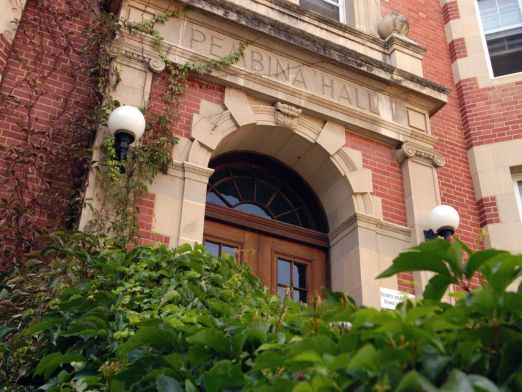Chinese Language Program celebrated at Faculty Teaching Awards
Kalina Broda - 1 May 2023

The third floor of Pembina Hall is home to the Department of East Asian Studies
Thousands of unfamiliar characters. Phonemes from a faraway land. Native English speakers tend to quiver in the face of learning a new language like Chinese.
“There’s this conception that if undergrads try to take this language, it’s going to kill their GPA or that they’ll never be able to learn it,” says Daniel Fried, East Asian Studies Department Chair.
Thanks to the Chinese Language Program’s group of dedicated instructors, however — this year’s recipients of the Faculty of Arts Unit Teaching Award — students are conquering the daunting language, and even attesting to a new-found confidence in life.
“I was blown away seeing not just how much students learned in Chinese — but how the whole process of learning Chinese gave them a new confidence in their life,” says Fried, who put forward the program’s nomination.
As part of the nomination package, several graduates shared their program experiences through letters, citing that learning Chinese inspired them to take the next step in their academic and professional careers, whether it be starting grad school or starting their own business.
Some graduates even went on to become famous translators or be celebrated on Chinese television for their language ability.
“It’s tremendous to see students conquer this thing that they were so afraid of and feel inspired to do more,” says Fried. “This is the way that university education is supposed to function when it’s at its very best — a broadening of intellectual and personal horizons that can lead students to better versions of themselves”.
Behind the program’s success is a group of devoted instructors. “We credit this all to the teachers who helped students get there,” says Fried. “This group accomplishes small miracles as their everyday job.”
Kuo-Chan Sun, Xinhui Liu, Qian Tang, Yan Wang, Anton Wierenga, Haiyan Xie and Li Yang are among the dedicated instructors who helped shape the program’s strong track record — and their individualized support for students starts well before each semester begins.
The instructors spend hundreds of hours rigorously screening students to determine appropriate course-level placements. The program draws in a wide range of students, from pure beginners to heritage speakers, and assessing their unique needs ensures students achieve maximum improvement in their language abilities, while also receiving a fair assessment.
Fried says another key to the East Asian Studies language programs’ successes is harnessing the latest curriculum research and language teaching methodologies. In recent years, the Faculty of Arts Teaching Awards have also recognized the Japanese and Korean language programs for their research-driven teaching practices.
“Like the other two language programs, the Chinese teaching unit works incredibly hard and uses the most up-to-date research about how to teach Chinese to English speakers or other languages in a North American academic context,” says Fried. “It’s integrated into everything, from the curriculum development to teaching activities and assessments.”
One of the program’s instructors, Li Yang, is also this year’s Dr. Helena Fracchia International Teaching Award recipient, which recognizes the outstanding contributions of either Faculty or Academic Teaching Staff who employ and encourage international teaching methodologies.
Several years prior to the pandemic, Yang managed the department’s study abroad program in Harbin, China, one of the university’s largest study abroad programs. This year, she also played an instrumental role in restarting the summer Mandarin program in Taipei.
“We’ve been so fortunate to have her with us for so many years,” says Fried. “Both from my and the students' perspectives, she's done a fantastic job of making sure the educational experience is high-quality, safe and fun.”
Honouring East Asian heritage
Preserving natal languages also serves as a chance to celebrate and honour communities across the region.
Every year, the programs draw in students of Eastern Asian heritage seeking to improve their ability to communicate and connect with family members.
“The Chinese, Korean and Japanese language programs have been foundational not just for our students but for the communities of Asian heritage that we serve in Alberta,” says Fried. “We’re so fortunate that we can help people maintain connections with their own family traditions.”